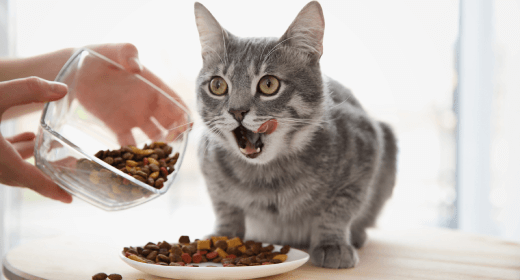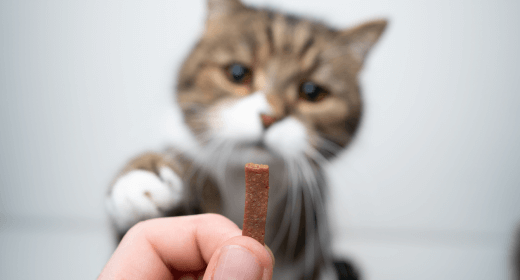

Taurine is an important component to all IAMS™ cat foods, such as IAMS ProActive Health™ Adult Original with Chicken.
Taurine is an essential amino acid that is critical for normal heart muscle function, vision, and reproduction in kittens. It is also needed to form the bile salts that aid in digestion. Unlike other amino acids, taurine is found as a free amino acid in body tissues such as the heart and eyes and is not incorporated into proteins
Most mammals manufacture taurine from other amino acids. However, cats cannot manufacture enough and, therefore, must acquire enough additional taurine through diet to meet their needs. In pet food, taurine is naturally found in animal-based protein ingredients and can also be added separately.
Taurine helps in maintaining normal vision, heart muscle function, digestion, normal pregnancy and fetal development, and a healthy immune system. Taurine for cats can only be found in animal-derived proteins.
Taurine can be made by dogs from two other amino acids: cysteine and methionine. As a result, it isn't regarded necessary in their diet. But since taurine is an important ingredient, you can add it to your pet’s diet due to its numerous health benefits.
Taurine criteria for commercial dog food have yet to be established. If you are worried that your dog may have inadequate taurine or if you need guidance on how much taurine to include in your dog's diet, it is best to consult your veterinarian.
It is vital to include taurine in your cat’s food because cats cannot synthesize it. If your cat's food has too little taurine, it will become taurine deficient, which can lead to a range of major health concerns. For example, taurine could cause your cat’s retinas to degenerate and make your pet go blind. Further, this lack of taurine can stifle growth and make it difficult for you cat to reproduce.
Therefore, the minimum taurine requirement for adult cats in commercial pet food is 25mg/100 kcal for dry food and 50mg/100 kcal for canned foods, according to the Association of American Feed Control Officials Publication, 2018. However, because taurine requirements vary from one cat to the next, it's always a good idea to check with your vet if you're concerned that your pet isn't getting enough.
IAMS dry cat foods also include taurine as an ingredient to supplement the primary source of this amino acid, which is animal-based protein from sources such as chicken, egg, lamb, and fish. However, these sources can vary in their taurine content, and adding more taurine is a sound approach to ensure optimal taurine levels.Ü
Health benefits of Taurine
Taurine is an amino acid found in muscles, the heart, the brain, and the retina, among other tissues and organs. Unlike most amino acids, taurine does not form cell proteins but has a variety of other functions. Here are some taurine benefits for cats:
Taurine deficiency can cause serious health problems for your cat over time because it is required for many regular metabolic functions. Some of the issues include:
IAMS cat foods are formulated with high-quality, animal-based proteins as their primary ingredient. In addition, they are supplemented with extra taurine to ensure balanced levels of essential amino acids.
IAMS Proactive Health Healthy Adult with Chicken and Salmon are one of the best foods to feed your cat. This nutrient-dense cat food is available in chicken and salmon flavors. These food ingredients act as the first ingredient to promote a healthy body for play. It also contains natural fiber and prebiotics, which help your cat's digestion. What’s more is that it helps your cat develop strong muscles with rich amounts of protein and provides a complete and balanced diet with no fillers.
Taurine has no significant side effects and is well-tolerated by cats when added correctly. The only side effect reported is minor vomiting which is lessened by providing a supplement with food.
In the late 1980s, taurine was discovered to be an essential component of a cat's diet. Since then, all cat foods have been enriched with plenty of taurine to suit their individual demands.
A high number of cats given unfortified commercial foods suffer from taurine insufficiency. Because cats can't absorb all of the taurine in processed foods and/or can't synthesis the difference between absorption and demand, taurine is considered an essential amino acid for cats.


Most of us check ingredients and nutritional information on packaging when buying food for our pets. However, reading the nutritional data on a cat food label can get confusing. So, how do you know whether your pet is getting the right food for a healthy body? In this blog, we look at what you can expect to find on a cat food nutrition label and help you improve your understanding of this information.
Cat food labels provide limited information regarding the nutritional value of the package contents. It is important for customers to know what can and cannot be determined from the label, and what information is particularly important. Major components of a pet food label include:
Guaranteed Analysis
Company/Customer Service Information/Satisfaction
Ingredient Panel
Manufacturing Code, Expiration, or 'Best Used By' Information
Feeding Instructions
AAFCO Statement of Nutritional Adequacy
Values in the guaranteed analysis are expressed as either minimum or maximum. A maximum guarantee (% max) means at most this specific amount of the nutrient is included in the formula. A minimum guarantee (% min) means at least this specific amount of the nutrient is included in the formula. The following four nutrients must be included on all pet food labels:
For example, a cat food with a 25% minimum crude protein guarantee should contain at least 25% protein but could contain much more. The only way to determine the actual amount is by laboratory analysis.
Other information may be guaranteed on cat food products, such as magnesium (% max), taurine (% min), ash (% max), and linoleic acid (% min).
Animal-feed laws, particularly those pertaining to pet food, are dealt with by AAFCO. AAFCO is a coalition of governmental organisations in North America that aids in regulating animal food. Cat food with AAFCO label has an assurance that certain standards have been followed while manufacturing the food. Therefore, the food is said to meet the nutritional levels required by your pet. MARS pet food too complies with the standards of AAFCO and is nutritionally sound for your pet.
Ingredients must be listed in order of abundance (largest quantity listed first).
Because ingredient definitions and designations are standardized, it is difficult to determine the quality of ingredients. Ingredient quality can only be determined from laboratory analysis and animal feeding tests.
Here is the information that is required on a cat food label:
Distributor Name and Address: This gives you information about the manufacturer of the food, so that you can get in touch with them if you have any issues about the product.
Net Weight: This tells you how much food is contained in the package.
Ingredient List: The ingredients are listed in decreasing order, depending on the weight of the contents.
Product Traceability: Using the information on cat food label, you can identify when the food was prepared and even the precise factory that made the package.
Statement of Nutritional Adequacy: A ‘complete and balanced’ cat food should either meet or exceed the defined standards of nutrient profile. It explains which exact cat age and lifestyle the food is meant for.
Assurance of Analysis: This indicates the product’s nutritional content. It must contain the highest amounts of crude fiber and moisture and the minimum amounts of crude protein and crude fat. Although optional, percentages for other nutrients are frequently included. However, the key elements mentioned in the assured analysis of the cat food nutrition label must meet AAFCO’s nutrient profile guidelines.
Calorie Declaration: Calories are stated on a kilocalorie per kilogram basis and other commonly used units of measurement such as kilocalories per cup. You can compare several cat food products using this information.
Direction for Feeding: You can use these recommendations to figure out how much food to give your cat each day. Additionally, you might need to change the amount of food your pet consumes to assist them in maintaining an ideal body condition.
AAFCO nutritional adequacy statements are required on all pet foods. Products may either be formulated or tested according to AAFCO procedures and recommendations.
A 'tested' statement indicates the product has been formulated, then fed to cats prior to sale to ensure it meets important criteria related to growth, maintenance, and/or reproduction.
Veterinary-exclusive products include statements such as, 'This product is intended for intermittent feeding only' and 'Use only as directed by your veterinarian.'
Manufacturing codes allow the company to track products for quality and inventory issues. In order to quickly and efficiently handle a customer inquiry, the company's customer service department will usually ask the customer for this code.
Expiration or 'Best Used By' dates are optional but are helpful in determining product freshness and shelf life.
Here are a few tips to help you read a cat food nutrition label.
Know the intent or purpose: The food must state that it is for cats on the container. Cats have highly specific nutritional requirements that necessitate a certain type of diet.
Choose the right product for your cat: The information on the back of the cat food container is extremely important. You can determine whether the food will offer a complete and balanced diet for your cat’s life stage by reading the nutritional adequacy statement. The term 'life stage' describes a cat's particular stage of growth. The information can also state that the food is suitable for cats at all life stages, for breeding cats (growth and reproduction), and, possibly, for indoor or outdoor cats.
The manufacturer's information should include the company name, address, and phone number so customers can quickly and easily obtain product information.
A toll-free telephone number should be provided as a convenience to the customer and to ensure that a charge is not incurred when calling for information.
The satisfaction guarantee should be an 'active' statement. This means that in addition to stating that the product is guaranteed, the company should indicate what action will be taken to meet customer expectations (replace product, money returned, etc.).